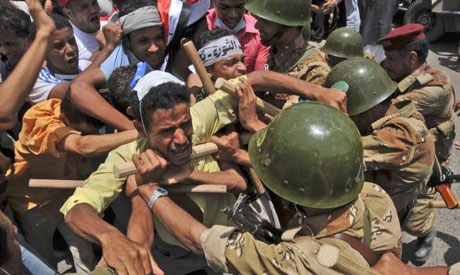
Yemeni army soldiers push back anti-government protestors in Tazi city (Photo-AP)
President Ali Abdullah Saleh, who has seen protests demanding that he resign swell since January to bring hundreds of thousands onto the streets, on Friday rejected a Gulf Arab plan to secure an end to his 32 years of autocratic rule.
The protesters, inspired by revolts elsewhere in the Arab world, have grown increasingly frustrated. At least 27 people have been killed in clashes with security forces this week.
On Saturday evening, hundreds of demonstrators who tried to break through a police barricade in the southern city of Taiz to march to a presidential palace were met with gunfire and teargas from security forces, witnesses said.
"One person is clinically dead and 43 were shot, three of whom are in critical condition," said Rahim al-Samiei, a doctor caring for the injured, told Reuters.
He said about 30 people had been hurt by batons and rocks and more than 500 were suffering from teargas inhalation.
In Sanaa, clashes broke out as protesters tried to expand their protest camp, residents said.
Dozens were wounded when men in civilian clothes believed to be security officers opened fire, and about 350 suffered from teargas inhalation, medics said.
Saleh, long backed by the United States and neighbouring Saudi Arabia as a bulwark against regional instability, especially against al Qaeda's active Yemeni branch, is now under increasing pressure from both to negotiate a quick exit.
The deaths of scores of protesters at the hands of security forces have begun to convince countries of the region that Saleh is now an obstacle to stability in a country that sits on a shipping lane carrying more than 3 million barrels of oil a day.
Some 40 percent of Yemen's 23 million people live on less than $2 a day and one third face chronic hunger. Exasperation with state repression and rampant corruption have added further fuel to the pro-democracy movement.
Saleh initially accepted an offer by Saudi Arabia and other Gulf Arab states including Qatar, as part of the Gulf Cooperation Council (GCC), to hold talks with the opposition.
But on Friday, he told tens of thousands of supporters in the capital: "We don't get our legitimacy from Qatar or from anyone else ... We reject this belligerent intervention."
On Saturday, a Foreign Ministry official said Yemen would withdraw its ambassador from Qatar for consultations.
Qatari Prime Minister Sheikh Hamad bin Jassim al-Thani, who had said the GCC would strike a deal for Saleh to leave, struck a conciliatory tone.
"We have to focus on resolving the problem (in Yemen) ... the Yemeni president and everyone in Yemen knows that we respect and appreciate them," he told Al Jazeera television.
He said the Gulf states would meet in Saudi Arabia on Sunday to discuss their Yemen initiative.
Earlier on Saturday, a march by tens of thousands of demonstrators in Taiz ended peacefully earlier after army units loyal to General Ali Mohsen, who defected from Saleh's camp weeks ago to back the protests, stood between the crowd and security forces preventing clashes, residents said. Mohsen has repeatedly said he has no ambitions to take power.
Even before the protest wave, Saleh was struggling to quell a separatist rebellion in the south and a Shi'ite insurgency in the north, violence that has given al Qaeda militants more room to operate.
In the southerly Abyan province, government troops fought to retake the city of Jaar from Islamic militants who overpowered them two weeks ago. One soldier and three militants were killed and three soldiers were wounded, a local official said,
In Aden, the main port in south Yemen, hundreds of youths including schoolchildren marched against Saleh, blocking traffic and asking shops to close.
Residents said police had shot in the air to disperse the demonstrators, who have been calling for acts of civil disobedience to paralyse the city.
In the Crater district of Aden, four protesters were wounded by gunmen in civilian clothes, residents said.
Short link: